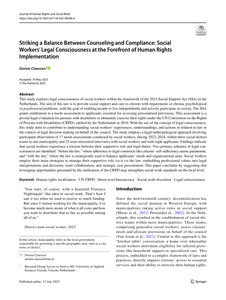Research question: The current study investigates the income elasticities and socio-economic determinants of direct and indirect sports expenditure categories by means of a log normal hurdle regression. Research methods: The data stem from a representative sample of 3005 Flemish families with school-aged children, gathered through a sports-specific survey. A log normal hurdle regression was used to calculate the determining factors and expenditure elasticities of expenditure on sports participation. Results and findings: The results indicate that income, education and the age of the youngest child are positively related to almost all sports expenditure categories, while the number of family members and degree of urbanisation are significant for only a number of the expenditure categories. The elasticity value of the direct sports expenses is smaller than is the case for indirect sports expenditure. Between the expenditure categories large differences exist, as relatively large elasticities are found for sports holidays, transport and sports food and drinks, as opposed to low values of sports events, sports club membership, entrance fees for sports infrastructure, sports camps, clothing, footwear and equipment. Implications: The fact that income significantly influences all expenditure categories demonstrates that further policy intervention is required to make sports consumption more accessible to lower income groups. Sports enterprises and policymakers need to be aware that negative income shifts have a more profound impact on the indirect expenditure categories, and that certain sports activities (e.g. participation events) are relatively more favoured by low-income groups than is the case for sports club membership
LINK
This study explores legal consciousness of social workers within the framework of the 2015 Social Support Act (SSA) in the Netherlands. The aim of this law is to provide social support and care to citizens with impairments or chronic psychological or psychosocial problems, with the goal of enabling people to live independently and actively participate in society. The SSA grants entitlement to a needs assessment to applicants, essential for accessing personalized provisions. This assessment is a pivotal legal evaluation for persons with disabilities to ultimately exercise their rights under the UN Convention on the Rights of Persons with Disabilities (CRPD), ratified by the Netherlands in 2016. With the use of the concept of legal consciousness, this study aims to contribute to understanding social workers’ experiences, understandings, and actions in relation to law in the context of legal decision-making on behalf of the council.
MULTIFILE

Light scattering is a fundamental property that can be exploited to create essential devices such as particle analysers. The most common particle size analyser relies on measuring the angle-dependent diffracted light from a sample illuminated by a laser beam. Compared to other non-light-based counterparts, such a laser diffraction scheme offers precision, but it does so at the expense of size, complexity and cost. In this paper, we introduce the concept of a new particle size analyser in a collimated beam configuration using a consumer electronic camera and machine learning. The key novelty is a small form factor angular spatial filter that allows for the collection of light scattered by the particles up to predefined discrete angles. The filter is combined with a light-emitting diode and a complementary metal-oxide-semiconductor image sensor array to acquire angularly resolved scattering images. From these images, a machine learning model predicts the volume median diameter of the particles. To validate the proposed device, glass beads with diameters ranging from 13 to 125 µm were measured in suspension at several concentrations. We were able to correct for multiple scattering effects and predict the particle size with mean absolute percentage errors of 5.09% and 2.5% for the cases without and with concentration as an input parameter, respectively. When only spherical particles were analysed, the former error was significantly reduced (0.72%). Given that it is compact (on the order of ten cm) and built with low-cost consumer electronics, the newly designed particle size analyser has significant potential for use outside a standard laboratory, for example, in online and in-line industrial process monitoring.
MULTIFILE